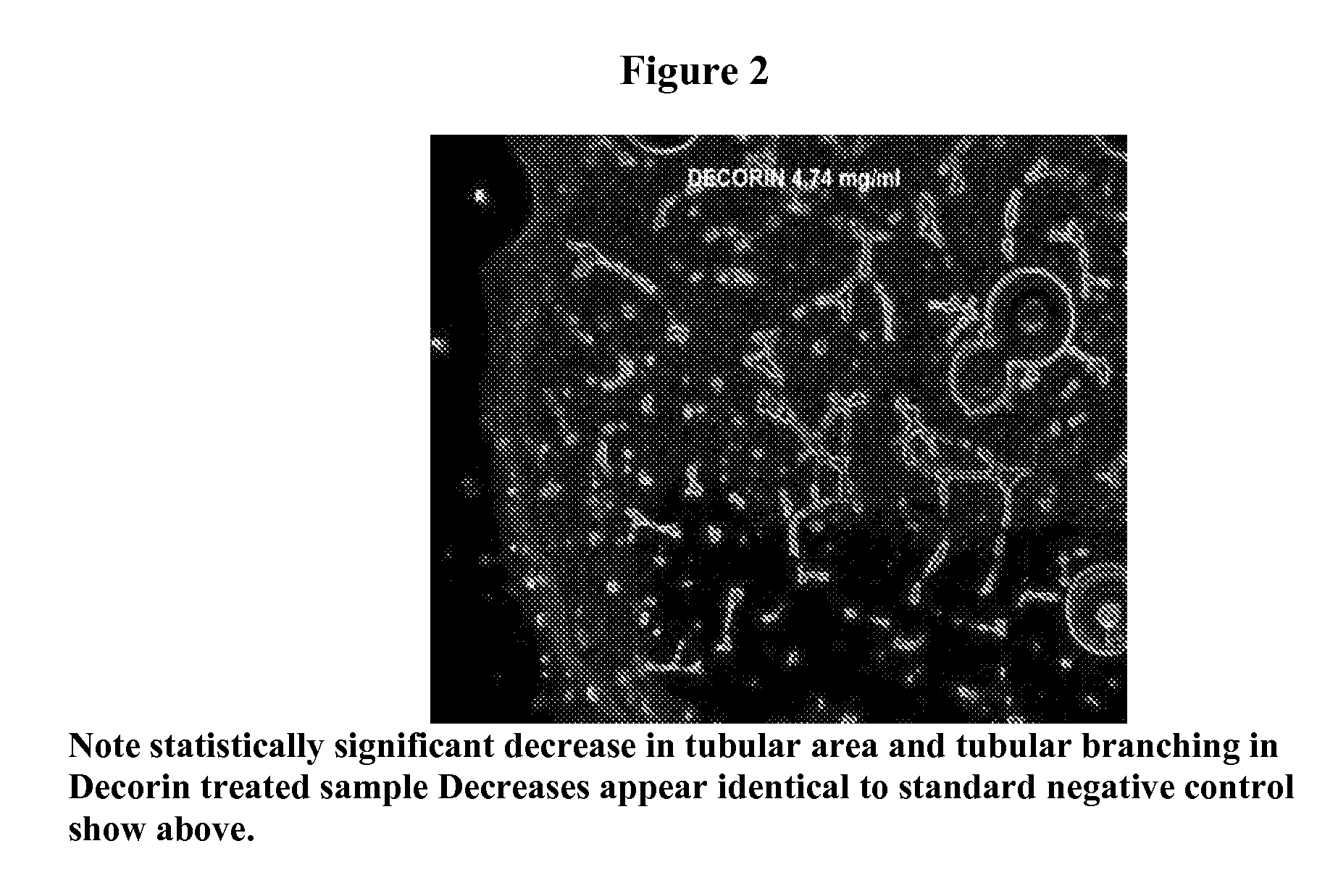Composition and methods for the prevention and treatment of macular degeneration, diabetic retinopathy, and diabetic macular edema
a technology of diabetic retinopathy and macular edema, which is applied in the direction of drug compositions, peptide/protein ingredients, metabolic disorders, etc., can solve the problems of loss of central vision, bleeding and damage to surrounding tissue, and very delicate vessels, so as to prevent or delay the development of diabetic retinopathy and diabetic macular edema, and stabilize the inter-
- Summary
- Abstract
- Description
- Claims
- Application Information
AI Technical Summary
Benefits of technology
Problems solved by technology
Method used
Image
Examples
example 1
Measurement of Intravitreal Injection of Decorin in the Rabbit Model
[0074]The rabbit vitreal Replacement Bioassay was conducted at Insight Biomed (Isanti, Minn.). Six rabbit eyes received intravitreal injection of 0.5 mL of decorin (4.74 mg / mL in 10 mM NaPO4+150 mM NaCl pH 7.0 following removal of an equal volume of vitreous humor. Contralateral eyes served as a non-operated control. Animals were monitored post-operatively until recovery from anesthesia. At 48 hours the animals were anesthetized by intramuscular injection of Xlyazine (10 mg / Kg body weight), Ketamine (50 mg / kg body weight), and Acepromazine (0.5 mg / kg body weight). Eyes were dilated using topical 2.5% phenylephrine HCl and 1% tropicamide. At 48 hours post injection, both control and treated eyes were graded for ocular inflammation as per the Rabbit Vitreal Grading Scale prior to removal of a vitreal sample. Proparacaine 0.5% was administered topically prior to removal of the 0.5 ml vitreal test sample. Cell counts an...
example 2
Angiogenesis Inhibition Test-CAM ASSAY
[0077]Recent studies conducted for Euclid Systems have clearly demonstrated the anti-angiogenic activity of human recombinant decorin core protein. Anti-angiogenic activity was demonstrated in the standard chorioallantoic membrane (CAM) in fertilized eggs. Study conducted by MB Research Laboratories, Spinnerstown, Pa. (Project No.10-18858.09). Results are shown below demonstrating a dose related inhibition of vascularization.
TABLE 1Inhibition of vascularization from CAM AssayConcentration01.22 mg / mL2.42 mg / mL4.87 mg / mL% Inhibition00.1880.200.5
example 3
Anti-angiogenesis Cell Tube Assay
[0078]Additional studies evaluated the anti-angiogenic properties of decorin in the Matrigel Tube Formation Assay. This assay is one of the most specific tests for angiogenesis and measures the ability of endothelial cells to form three-dimensional structures (tube formation). Inhibition of tube formation is directly related to anti-angiogenesis activity. Decorin was found to be a significant inhibitor of tube formation, equal to or even more inhibitory than the negative control. It is believed that inhibition may be associated with stabilization of the endothelial cell layer as well as inhibiting growth factor stimulated angiogenesis. (see FIG. 1)
PUM
 Login to View More
Login to View More Abstract
Description
Claims
Application Information
 Login to View More
Login to View More - R&D
- Intellectual Property
- Life Sciences
- Materials
- Tech Scout
- Unparalleled Data Quality
- Higher Quality Content
- 60% Fewer Hallucinations
Browse by: Latest US Patents, China's latest patents, Technical Efficacy Thesaurus, Application Domain, Technology Topic, Popular Technical Reports.
© 2025 PatSnap. All rights reserved.Legal|Privacy policy|Modern Slavery Act Transparency Statement|Sitemap|About US| Contact US: help@patsnap.com


